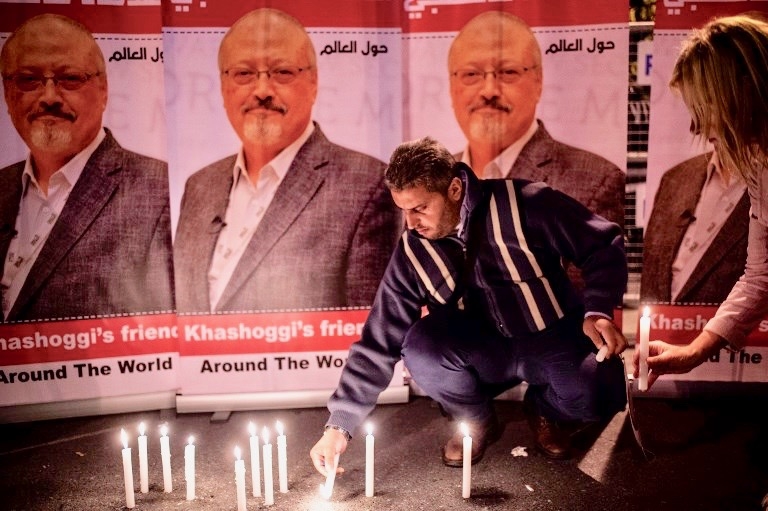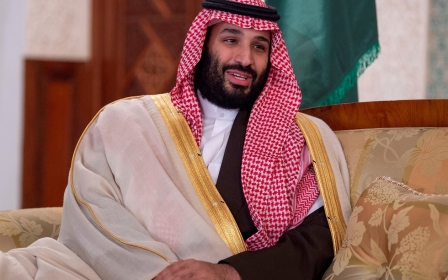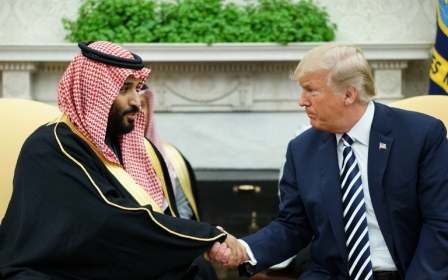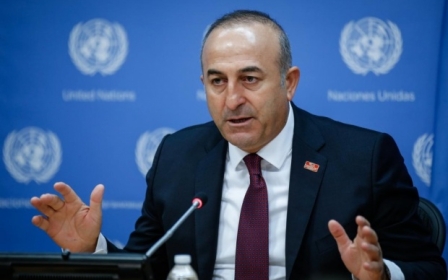Jamal Khashoggi killer heard saying 'I know how to cut' in recording: Erdogan

One of Jamal Khashoggi's killers is heard saying "I know how to cut" in an audio recording of the Saudi journalist's murder, Turkish President Recep Tayyip Erdogan said.
In a speech in Istanbul on Friday, Erdogan said Turkey has shared the audio recording of Khashoggi's killing with several countries, including the United States and France.
"The United States, Germany, France, Canada, we made them all listen ... The man clearly says, 'I know how to cut,'" Erdogan said.
"This man is a soldier. These are all in the audio recordings," he added, without giving further details about the recording, or the identity of the man who uttered the phrase.
Erdogan's comments come a day after the US Senate unanimously passed a resolution to hold Saudi Crown Prince Mohammed bin Salman responsible for the murder of Khashoggi, a Saudi government critic and Washington Post columnist who was killed inside the Saudi consulate in Istanbul in early October.
They think the world is dumb. This nation isn't dumb and it knows how to hold people accountable
- Turkish President Recep Tayyip Erdogan
The CIA concluded last month that bin Salman, known as MBS, ordered the journalist's assassination, but Riyadh denies the crown prince was involved.
Several top aides to the crown prince have been accused of orchestrating the killing. The Gulf kingdom has also arrested 21 people in connection with the murder and says prosecutors are seeking the death penalty for five suspects.
Still, Erdogan criticised Saudi Arabia on Friday for repeatedly changing its story about what happened to Khashoggi. At first, Saudi officials said the journalist left the consulate unharmed, then they said he died after a fist fight broke out, and later, they admitted that his murder was premeditated.
"The prince [MBS] says Jamal Khashoggi left the consulate. Is Jamal Khashoggi a kid? His fiancee is waiting outside," the Turkish president said.
"They think the world is dumb. This nation isn't dumb and it knows how to hold people accountable."
Pressure on Saudi Arabia and MBS
Middle East Eye previously reported that Khashoggi was killed within seven minutes of entering the consulate on 2 October.
Salah Muhammad al-Tubaigy, the head of forensic evidence in the Saudi general security department, was one of a 15-member Saudi squad that arrived in Istanbul earlier that day on a private jet.
Tubaigy began to cut Khashoggi’s body up on a table in the study while he was still alive, a Turkish source told MEE in mid-October. As he started to dismember the body, Tubaigy put on earphones and listened to music.
“When I do this job, I listen to music. You should do [that] too,” Tubaigy was recorded as saying, the source told MEE.
Turkish officials said last week that the Istanbul prosecutor's office had concluded there was "strong suspicion" that Saoud al-Qahtani, a top aide to MBS, and General Ahmed al-Asiri, who served as deputy head of Saudi foreign intelligence, were among the planners of Khashoggi's killing.
After Riyadh ruled out extraditing the two men, however, Turkey said this week that the world should seek out justice for Khashoggi under international law.
Erdogan has repeatedly said he would not give up the case.
US President Donald Trump, meanwhile, has repeatedly vowed to stand by Riyadh despite Khashoggi's murder, a position that has pitted him against several key US lawmakers.
Thursday's Senate resolution was widely viewed as both a sharp rebuke of MBS and a public critique of Trump's unwavering support for the Saudi leader and the country as a whole.
The motion blamed MBS for Khashoggi's murder and urged the Saudi government to ensure "appropriate accountability" for all those responsible.
It is one of several measures introduced in recent weeks in the US Congress that seek to condemn the Saudi crown prince and put pressure on the Trump administration to reassess its relationship with the Saudi government, as well as its support for the Saudi-led war in Yemen.
Middle East Eye propose une couverture et une analyse indépendantes et incomparables du Moyen-Orient, de l’Afrique du Nord et d’autres régions du monde. Pour en savoir plus sur la reprise de ce contenu et les frais qui s’appliquent, veuillez remplir ce formulaire [en anglais]. Pour en savoir plus sur MEE, cliquez ici [en anglais].




